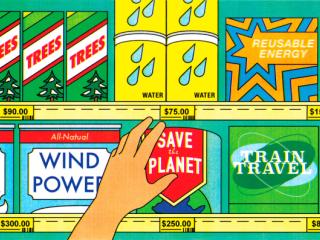You know those moments when everything clicks and you’re performing at your peak? Jamie Wheal explains the science behind flow states.More
Science and Technology
One of the most famous experiments of modern science was a series of pioneering field studies of the great apes. They were all done by women, chosen by legendary anthropologist Louis Leakey. Jane Goodall and Birute Galdikas tell this amazing story.More
Manu Prakash invented a paper microscope that’s now being used in research labs and classrooms around the world.More
How does the world look to a scientist? We asked astrophysicist Neil deGrasse Tyson….and he gave us some cooking tips.More
Nothing makes Hope Jahren happier than tinkering in her lab, studying fossilized plants. More
After a health scare, Annabel Abbs promised herself she'd make a real effort to walk every day. She fell in love with walking, even began taking multi-week walking vacations. And then she discovered she wasn't the only one — there's a hidden history of great women walkers from the past. So she decided to tell their stories.More
Unless you walk or bike to your next vacation destination, you’ll probably have to burn some fossil fuels to get there. Blogger Kathryn Kellogg is a guru of zero-waste living. She has a few tips on how to reduce your impact on the environment when you travel. More
Is there a special mountain in your life? David Hinton, who lives in Vermont, told us about the one he knows best — Hunger Mountain - which he's climbed 300 times. His thinking about mountains has been shaped by his study of ancient Chinese poetry.More
Environmental philosopher and bonafide "mountain man" John Hausdoerffer explains how mountains are connected to all life on earth, and what it means to treat them as "living kin."More
We're part of an extended web of kinship that includes not just people, but plants, animals, rivers and mountains. For Regina Lopez-Whiteskunk, a member of the Ute Mountain Ute Tribe, that knowledge has been passed down through many generations.More
People in the Andes have been telling stories about their mountains for centuries. Writer and educator Lisa Madera says they tell us something essential about the nature of mountains as geologic marvels and sacred sites.More
Heather Swan is a writer with a gift for listening to the natural world. Still, she didn't know what to make of the barred owl who came to visit her every day for three weeks. And then she realized, with a jolt, the owl had a message for her.More
It's one thing to imagine the intelligence of a forest, but could you experience it? The Japanese concept of "forest bathing" might help. Forest guide Amos Clifford is a former Zen teacher who's one of the world's experts on forest bathing.More
Richard Powers’ “The Overstory” has overturned a lot of conventional thinking. Though human characters shape the plot of this 500-page epic, the real heroes are trees.More
Suzanne Simard is a forest ecologist who's revolutionizing our understanding of trees. She has discovered that trees use underground networks to communicate and cooperate with each other. It turns out that whole forests can exist as a superorganism.More
There's a famous sequoia named General Sherman that's the biggest tree on the planet. It has its own distinctive history linked to the Civil War general and a radical anarchist group. Cultural historian Daegan Miller tells this fascinating story.More
Ethnobotanist Gary Paul Nabhan has been called the “father of the local food movement.” Many of his insights come from the farming practices of Indigenous people living near the U.S.-Mexico border, who’ve grown food in arid habitats for centuries.More
Locking eyes with another creature in the wild can be a profound experience. For physicist and writer Alan Lightman, half a second of eye contact with a pair of ospreys felt like an epiphany.More


















